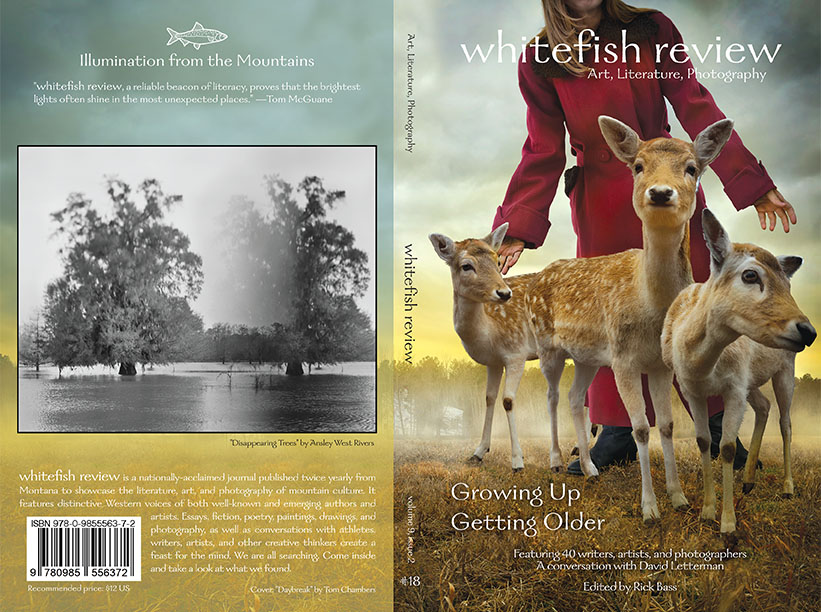Getting to the Heart of David Letterman
The beloved king of comedy—and part time Montana resident—talks about growing up and getting older.
By Brian Schott
Published December 16, 2015 by Whitefish Review
As of his final Late Show this past May, David Letterman had hosted 19,932 guest appearances on 6,028 broadcasts across more than 33 years—and redefined late-night and humor itself along the way. The man had earned some peace and quiet. Judging from the searching, thoughtful interview he granted to the Whitefish Review, he has found both—thanks, in large part, to life on his ranch in northwest Montana.
In an interview with Jane Pauley prior to his retirement, Letterman talked about the “white-hot adrenaline” he’d felt on his early appearances on The Tonight Show with Johnny Carson: “It’s like you’re sitting on the knee of the Lincoln Memorial and Lincoln is talking to you. You know, it’s like, ‘Holy God, it’s the guy on the $5 bill talking to me.’” That’s about what it feels like to interview David Letterman.
After a good breakfast, a long walk, some quiet breathing, and a pep talk from my wife, I was able to calm my nerves and have a candid, wide-ranging conversation with Letterman on the telephone from his home in New York State. I followed up several days later with a few additional questions.
As I expected, Dave was introspective, funny and, more than anything, kind. Listening to him through the speakerphone—that unmistakable voice and laughter that I had grown up with—was as surreal and as special as it comes.
I owe thanks to Jeff Giles, a transplant from New York City and one of our new editors, for helping arrange the interview through his friend, Tom Keaney, Letterman’s publicist. Over nearly an hour of conversation across two interviews in late November, Letterman and I spoke about retirement, raising his son, his love of Montana, his own childhood, and growing that wildman beard.

Brian Schott: Hello, Mr. Letterman.
David Letterman: How are you, sir?
BS: I’m well. It’s a gorgeous Montana day. Blue skies. Snow-capped mountain peaks.
DL: What is your temperature?
BS: We were at 34 degrees about an hour ago. It’s pretty cold. Clear and cold last night.
DL: Sounds ideal. Sounds lovely and normal in a time when weather doesn’t seem to be normal anywhere.
BS: You can’t count on much these days.
DL: I was just telling Tom that I’ve been—I believe the word is perusing—the Whitefish Review collections you sent. I’m in love with the publication and I feel stupid because prior to a month ago when I received them I don’t think I was aware of it. It’s a delightful project and must be very satisfying to work with.
BS: Well thanks for saying so. That’s really generous. We’re working with author Rick Bass right now on this next issue and Tom probably told you that we picked the theme “Growing Up and Getting Older.”
DL: Well, yes. But first of all let me tell you this, particular to nothing. Yesterday I was walking around a small town in Connecticut and the commercial grid of this small town reminded me of the commercial grid of what I remember of Whitefish. Except it’s not surrounded by lakes, rivers, or mountains. And I just said to myself then and there—I’m moving to Whitefish. I told my wife last night and she thinks I’m kidding. But why wouldn’t you move to Whitefish?
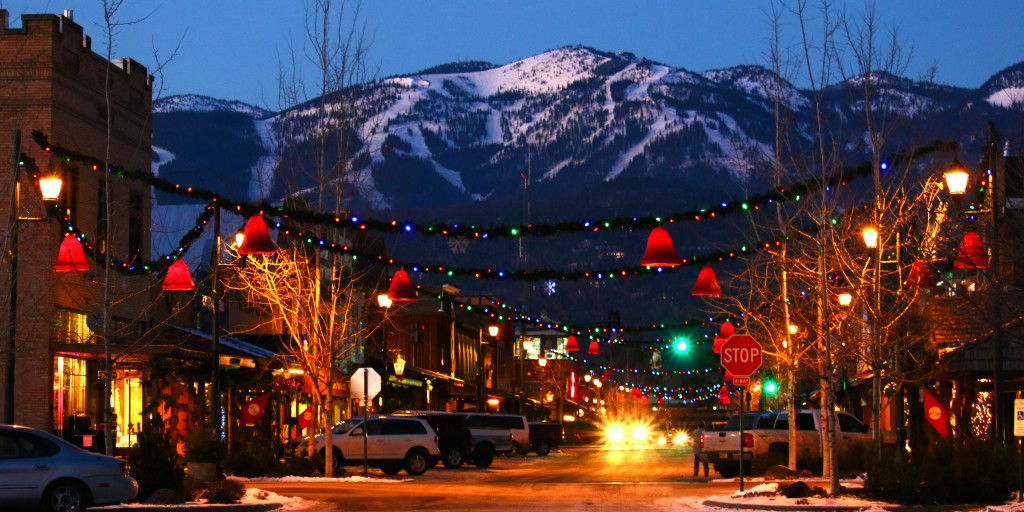
BS: That’s a good question. We could make you an intern here at Whitefish Review.
DL: I’ll do it. I’ve got nothing but time. (laughing)
BS: Yes, I love Whitefish. I grew up in New England, but I’ve been out here 20 years now.
DL: Where in New England?
BS: I grew up in Stow, Massachusetts, a tiny little town near
Concord—a little colonial, historic town.
DL: But that’s an oft-told story, isn’t it? Somebody from the East comes out and never goes back.
BS: Yes, I think it is. I hang out with quite a few New Englanders out here in Montana. The West has such a collection of people from everywhere.
DL: It’s just delightful.
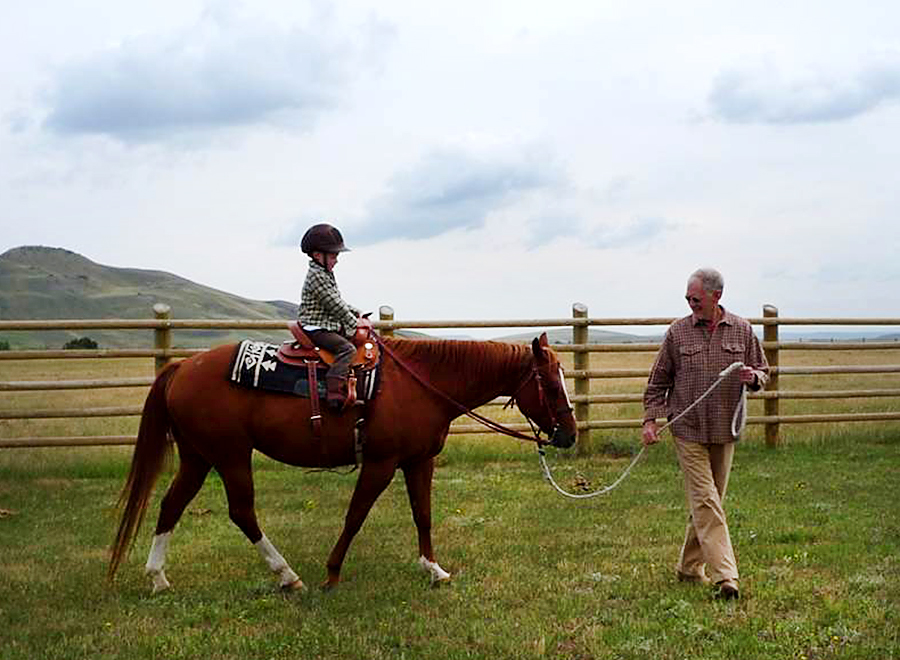
BS: So apparently, along this theme of growing older, we’ve heard that you’ve retired. (laughter)
DL: Yes, I have retired. I am no longer in show business.
BS: So how has that change in your life affected you?
DL: We did this television show—my friends and I—for a very long time. It’s probably like anyone else’s professional pursuit. When you are doing it for so long, and for each day—I have always likened it to running a restaurant—because you get response to the day’s endeavor immediately. Either from the audience or the ratings, but you know as early as the next day how you did.
And because of this introspection, you believe that what you are doing is of great importance and that it is affecting mankind wall-to-wall. And then when you get out of it you realize, oh, well, that wasn’t true at all. (laughter) It was just silliness. And when that occurred to me, I felt so much better and I realized, geez, I don’t think I care that much about television anymore. I feel foolish for having been misguided by my own ego for so many years.
BS: Are you able to look back with some pride and enjoy what you have accomplished or does your inner critic always get in the way?
DL: Well, I have this conversation with my wife all of the time. And my wife—I can’t tell yet whether she’s being diplomatic, whether she’s being polite, deferential—I just don’t know what it is—and she’ll say, “Well, look at what you’ve accomplished.” And I’ll say, “Well, what have I accomplished?” And she says, “Well, look. You’ve employed a lot of people for a long time…” (laughter) So I always laugh and think, okay, I’ve put a lot of people to work. And that’s usually the end of the conversation.
BS: (laughing) Well, you’ve certainly made a lot of people laugh and take a lighter look at—
DL: Well, I’d like to see the paperwork on that. But as to your theme here, I was thinking a bit about that. How old are you?
BS: I am 44 years old.
DL: Okay, good enough.
BS: I’m starting to have to think about the answer to that question. I’ll soon be getting closer to 50 than will feel comfortable. My brain feels really young, but my body is starting to get a little more stiff and sore on the ski slopes. It’s a wild ride. We have a ten-year-old son and a three-year-old son. So they keep us hopping.
DL: Well that was my point. Our son just turned 12. And you mentioned skiing. We started skiing together when he was about four or five, because I wanted something we could do together—for the rest of my life certainly—and it’s worked out just fine. I’m happy to say that of all the places we’ve been lucky enough to ski, his favorite, and my favorite—well we liked Alyeska pretty well up in Alaska—but in the lower 48, our favorite, without question is Big Mountain [in Whitefish]. We just really get a kick out of that place.
BS: It is a really special place. Well, if Harry needs a tour guide, my son Ethan would love to show him around.
DL: Okay, cool. Well, I’m moving out there, so I’ll let you know.
BS: That’s right. We’ve got you docked for the internship. (laughter) On a more serious note, what’s the mood right now in New York after the attacks in Paris?
DL: Well, I’m north of New York City and the television coverage has been on in everybody’s house and it’s that sickness, that vague sickness that you feel. We felt it here vividly when we were attacked, and it’s hard to believe that we lived through that attack and then tucked it away some place and it was less vivid. Now you can see that the people in Paris and in that part of Europe are going through that vivid terror, the aftermath of it, and how to reconcile it, like we did on 9-11.
So, you worry about—well, my son goes to school in New York and we ride trains in and out of the city and we’re on subways—but so far, it’s like unless it happens in your lap, you just don’t have that visceral, gut-wrenching…. I don’t know how to articulate this. If you read about a typhoon in Singapore you can have empathy, but you don’t quite get it. Here, we have had that experience, so we do get it.
BS: You mentioned 9-11. You went back on the air a week later. I actually re-watched your monologue from that night. Your voice was shaking. You said, “Courage defines all other human behavior.” I wondered if you could talk about courage as it relates to growing up.
DL: Well, I know more about courage now being a father. I always used to say to people—you know when a co-worker might be facing surgery, or a co-worker might have a friend who is ill, the way things happen in people’s lives—and I would always want to say something meaningful, because you can’t really help other than to listen and say something meaningful. And I used to say, “Pretending to be brave is as good as being brave.” And I find myself applying that to my son. And this ties into the idea of growing up.
Because of my son I’m not growing up. Because of my son I do things I would have done when I was 12, to show him—look, you can do this. It’s okay. You can do this. Don’t be worried about this. Don’t be afraid to make a fool of yourself. A lot of this is in Montana. A lot of this is skiing or hiking. I have gotten into the habit of jumping into any body of water we come across when we’re hiking in Montana—that as you know, is really too cold for any form of life other than fish. (laughter) You can feel your heart being sucked into your digestive tract. And so I’ll just jump in. Because I want him to know that it’s okay for him to just jump in.
We’ll get in the river and we’ll float the river. We’ll get out of the boat and he and I will just float in the river. You know—let’s do stuff. So, I find on his behalf, I’m not growing up. You have to grow up to have some wisdom, but I think part of that is letting your kids know that there’s some pretty silly stuff that you can get away with that is going to enhance your life.
BS: Nice.
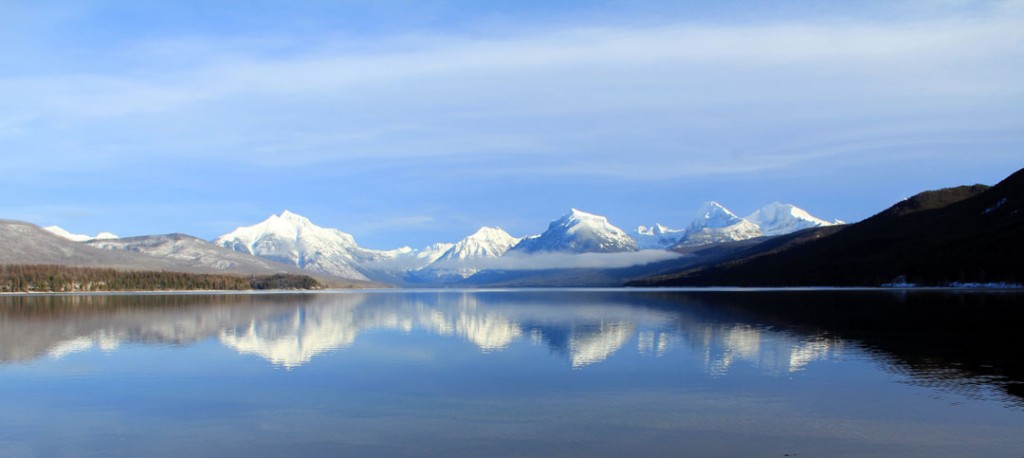
DL: Another thing I’ll tell you is that as I grow older, I can’t stop talking. You let me know when it starts to get dark and we’ll call it off. (laughter)
BS: Talkability is a wonderful trait. So, Tom Brokaw was nice enough to talk with us a few years back. He does a cold plunge in the mountain stream in his back yard every morning when he’s in Montana. Do you do the cold plunge out by your ranch?
DL: Yes, we do it in the summer and we do it anywhere we can. We have Deep Creek running through our ranch. We’re near the Teton River and we spend a lot of time in both of those. Down south we’ve been in the Ruby. We’ve been in the Madison. We’ve been in the Big Hole. I mean, how can you not? Well, it’s beautiful for one thing.
I’m no good at fishing, but I just like standing in the river. Years and years ago, Michael Keaton was talking about fishing in some publication, he mentioned the joy of putting his son on his back and wading across some river to go fly-fishing. I thought, wow, he’s a lucky man to have experienced that. And then lo and behold years and years later I got to experience the very same thing. The fact that his early comments meant so much to me and then later I was able to relive them, it increased the emotional impact of what he was talking about. And I’ll never forget it. I have a picture of my son and me in the Ruby River—he’s on my back. And that’s all you need to know about Montana.
BS: Can you talk a little bit more about your relationship to the space out here? Does the land have a real calming effect on you?
DL: Yes. Tom Brokaw is the reason we ended up in Montana. For years and years, Tom said [in Brokaw accent] ,“You ought to go to Montana.” And I said, “Okay, sure, Tom. Sure.” And I would look at Montana and I would think, Good Lord—who wants—why—I mean, look at that!—it’s too wide, for one thing. And so finally we went. And Tom said, “You’ll know where you’ll want to be. You’ll feel where you want to be.”
So we got ahold of a real estate guy and he took us around and he started running down celebrities and famous people—and they all live here and they all live there—and I said, “That’s fine, but that’s not where we want to live. We want to live someplace else.” And so we stumbled on the Rocky Mountain Front, where no one lives, because of the 200-mile an hour winds, but it was thrilling to be there.
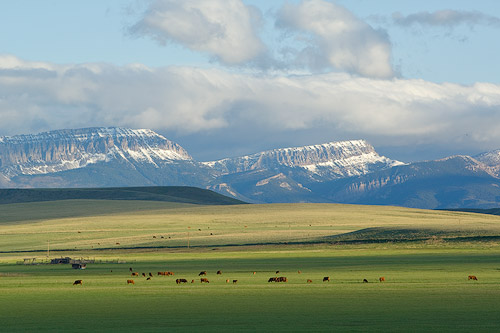
The first thing that this experience brought to us is that you just can’t stop seeing once you’re out there. The big sky and all—and for heaven’s sake, it’s true—but also the endless horizon. And we still haven’t gotten over the land. The other neat thing about this was it was like signing up for some extended college course where you began to learn about stuff you never thought about before in your life.
Every time we go out there we learn something about the land, about the animals, about the plants, about the trees, about the fires, about the wind, about the weather. It’s a never-ending education and it’s been so gratifying and so enriching for my wife and myself—she’s from Ohio, I’m from Indiana—and my son, it’s in him now. Whereas Tom Brokaw had to talk me into going to Montana, my son, he won’t have that problem. He’s there.
You must know something about the Front? The Chinooks and the winds?
BS: Yeah, it blows like hell over there.
DL: Yeah. Hurricane force and beyond. I can remember one day being out there just walking around. The wind was coming at me and it was fairly gentle. And what it was bringing to my ears was just dead quiet. And I couldn’t believe that the two things could exist—that the wind could be blowing and what it brought to you was absolute silence. The place is full of surprises like that. Full of experiences like that. And the process of learning is endless. Just through the dumb luck of having to shut Tom Brokaw up, it is something that has changed our lives.
I was thinking how unpleasant it would have been if Harry didn’t like being in Montana. Leave him back here with a sitter? (laughing) But it’s part of his life. If it’s just a fraction for his life of what it has been for our life, he will be a rich man forever. Did you notice that experience? That it never stops?
BS: The mountains out here really grabbed me and got into my heart. I never really expected to stay, but it really got inside me.
DL: The last time we were out there at Big Mountain—I guess they call it Whitefish Mountain now, you’re looking into the Canadian Rockies, then you’re looking back at Glacier, then you’re looking south to the ranges that run forever in that direction. One of my early ski instructors said to me that the first lesson in skiing is that when you get off the chairlift, take in the view. We’d been half way up the chairlift and it was like an IMAX movie. It’s beyond an IMAX movie—it’s all there. It’s crazy. You don’t see stuff like that.
BS: The scale is so massive that it’s indescribable.
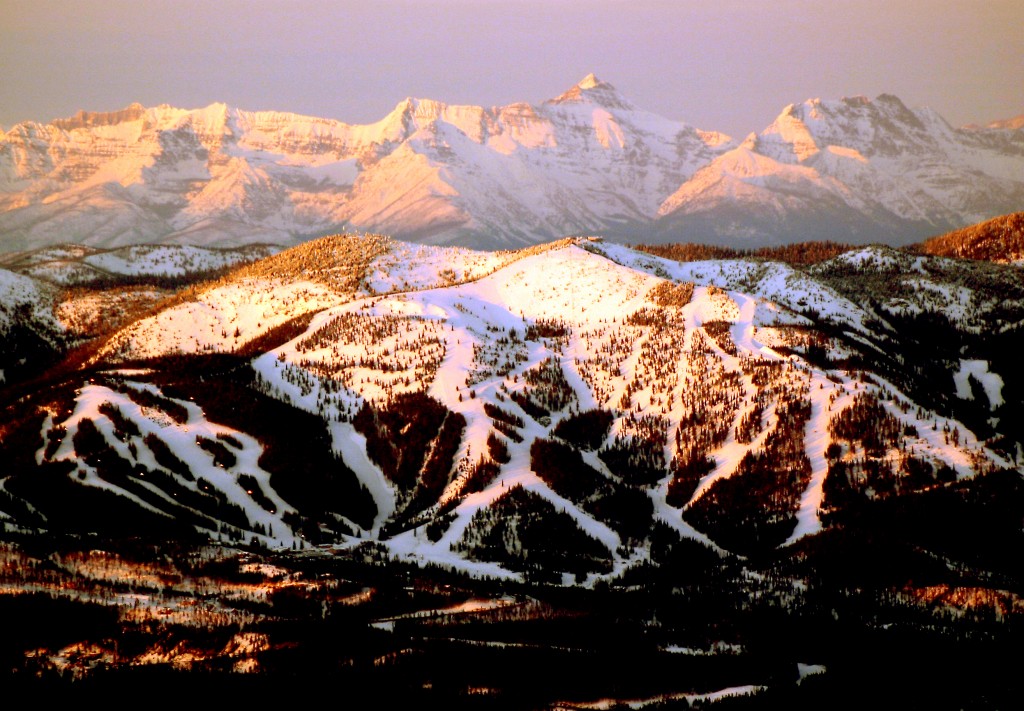
DL: The first time I went through Glacier I thought, I’m looking at the hand of god here.
BS: I said that same thing to my parents when I first moved out here and I was in Glacier Park with them. They were still wondering if I was going to move back east or if I was going to stay in Montana. I told them that when I was out in Glacier it was the closest I can describe being to god as I’ve ever been.
DL: From our location on the Front you can see up to three or four, maybe a half dozen different weather systems operating at once. It’s bizarre. It’s a special effect of some kind. And it’s just lovely.
BS: You’ve said that “life is hard work.” Is laughter a way to keep some of the harder and darker spots of life away?
DL: I suppose. It doesn’t work. It works superficially. You can make jokes at a funeral and that will create a vibration. But it doesn’t take away the grief. But it does something. It alters…I don’t know what it does. If you have the facility to make somebody laugh, I think you ought to go ahead and do it. It’s a nice gesture for somebody. And I’m in hyper-drive, because as parents know, the greatest thing you can do when your kid is first born is to try and make him laugh. And I try. He just got home from school and I will try as hard tonight as I did when he was three months old to make him laugh.
It’s a selfish thing, but what I’ve noticed now is that he makes me laugh so much that I feel like, well, maybe I had a little something to do with that.
BS: Do you watch any TV these days?
DL: Mostly news. I’m like the idiots who always used to come up to me—and I knew they were lying…. They’d say, “Yeah, well, geez I can’t stay up late enough to watch your show,” and I’d think, you’re lying, you’re just lying. But I’m like that guy now. I can’t stay up late enough to watch TV. I like to be in bed right around 10. Anything that happens after 10, I’m not there.
BS: Do you miss the craziness of the TV business more or less than you thought you would?
DL: No, I’m surprised—I can remember the first day that Stephen Colbert took over—put his [new] show on the air. I thought I would have some trouble, some emotional trouble, or some feeling of displacement, but I realized, hey, that’s not my problem anymore. And I have felt much better. It’s something for younger men and women to take on. So I haven’t missed it, the way I thought I might. And I do little things here and there to sort of keep me up and moving. But no, I don’t miss it the way I thought—and then I think, holy crap! I’ll be 69 next year and I’ve been doing this for 33 years. What did I want? Like you work until you’re a hundred? So there’s a lot of practical reasons why a person wouldn’t miss this.
BS: So in terms of getting older, when you had heart surgery 15 years ago, did it change your outlook on life?
DL: Well, it did. Compared to my father who dropped dead of a massive heart attack when he was 57—he had a history of heart problems. The advancements that they have made in treating heart disease are remarkable, as I think with all medicine. But when he had his first major heart attack—and he ended up having about six before the one that killed him. I can remember the president at the time was Dwight Eisenhower, and he had also suffered a heart attack. So Dwight Eisenhower was the hero for surviving heart attacks, both for my father and my father’s doctor.
You have a lot of questions when you’re in the hospital after a heart attack and my dad said, “Um, well, is it all right if I keep smoking?” And the doctor said, “Oh, yeah, that’s not a problem.” And my dad—you’d go to see him in the hospital recovering from a heart attack having a cigarette. Oh my god, really? So I feel that I am awfully lucky not to have had a heart attack and to have been treated the way I was treated, irrespective of the completely barbaric nature of the surgery. Once they get you open, it’s pretty fine work they are able to do.
It’s also made me realize that there are people in this world that you absolutely can trust—professionals who know what they’re doing. It’s easy to be cynical. It’s easy to be skeptical. But there are people who have been really well trained and are eager to help and save lives. And I found that gratifying.
BS: What do you look for in a houseguest—maybe a guest out to your ranch—and how does that differ for what you looked for in a TV guest?
DL: (big laughter) Well, there’s a couple of similarities. When we have guests at the house, I like them to be wearing makeup. That’s always good. (laughter)
But it’s interesting. We’ve had a lot of people to the ranch. Because you want to share this with people. And a lot of people don’t get invited back. Because for some reason they don’t get it. I don’t know if you’ve had that same experience. But when I first saw the Rocky Mountain Front, I had to get out of the car and walk around to calm down. I remember one time, I had a buddy of mine out there, someone I’ve known forever, and he says to me, “You have a tennis court out here?” Well I said, “Okay, let’s see, you’re not coming back.” So not everybody does come back. But if you respond to it, and your family responds to it, you’ve got the run of the place. You can come out any time you like.
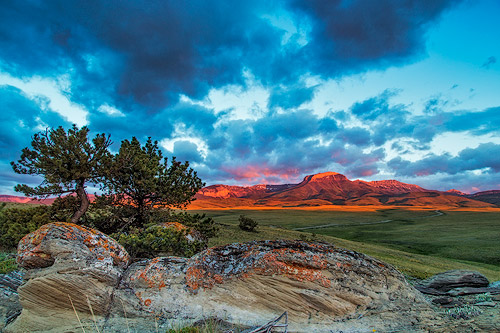
BS: So we saw a pretty good-looking lumberjack beard photo of you recently. We were just curious about your plans for your facial hair?
DL: You know what? I used to say, every day, “I am so sick and tired of shaving.” I had to shave every day, every day, for 33 years. And even before that when I was working on local TV. And I just thought, the first thing I will do when I am not on TV is stop shaving. And everybody hates it. My wife hates it. My son hates it. But it’s interesting. I’ve kind of developed a real creepy look with it that I’m sort of enjoying. And I can tell that people are off-put by it. And the more people implore me to shave, the stronger my resolve is to not shave. So the day that I shave, I’ll call you.
BS: Okay, perfect. At Whitefish Review we don’t have any requirements for shaved beards, so your internship would be safe here.
DL: (laughing) Good! And I know, it’s not a good-looking beard. But I don’t even care. I just don’t care. And it’s kind of fun—well, I won’t say that it’s fun to walk around irritating people, I think I’ve proved that on TV—but it’s sort of amusing to see the reactions.
BS: You’re a playful guy. A lot of people move out to the mountains so they can play. Some people refer to them as Peter Pans. I was curious—was there a part of you that never really wanted to grow up?
DL: Well, I don’t think of myself as having grown up. I think, like you mentioned, you feel like in your head you are still a certain age. I know I’ve grown old. But I don’t think I’ve grown up. I think I have achieved a certain level of wisdom, probably not what it ought to be, but in terms of growing up, no, I still like goofing around. I don’t know if I would qualify as a Peter Pan, but thanks anyway—
BS: No, that’s just the ski bums, not you—
DL: (laughing) I think about having grown old, yes. Grown up, no. No, not at all.
BS: Has your thinking about your childhood changed over the years?
DL: I do think a lot about it. Like everybody, the mirror of your life would be your kids. And you can see yourself, you can see a fairly accurate version of yourself, you can see a different version of yourself, but the reminder is always there. When I was a kid, god bless my parents—and I think I speak for generations, mine and prior—if there was trouble, it would be solved by a firm yank on the arm, or you might get spanked with any number of objects.
And I can see those moments with my son and I remember it would have gotten me a spanking. And I think to myself, I kind of see why my parents did it. I know you can’t do it anymore, so what the hell do I do? And so you’re sort of left to your own wits. What I usually do is I call Regina into the room and I say, “Can you take care of this for me? I’m going outside.”
BS: So you talk about that mirror and I’ve experienced that with my children. I’ll see them do something and realize, wow—I do that. That’s me. Does that happen to you?
DL: Well, as you know it can both be satisfying and be a frightful reminder. If it’s something positive, if it’s something good, and it’s usually some small things that you get some reward from when they come back out of the kid. But then also when you recognize behavior that is not positive, then it’s pretty frightening. The other day, I heard my son, I don’t know what he was doing but something had frustrated him, and I could hear him screaming, “Oh, for the love of god!” And I laughed out loud because I am constantly throwing myself around the house when I can’t get a jar open or I can’t find my car keys. And that’s kind of the signature line—“Oh, for the love of god!”
And when I heard that coming out of Harry in equally silly circumstances, it was pretty funny. But I also recognize, he’s almost pathologically shy. And I can remember when I was a kid, I was just quiet and shy and had no friends and that was fine with me. And it didn’t bother me when that was me, but when you see that behavior in your own kid, you think, jiminy, what have I done to the kid? On the other hand, it never really bothered me and I kind of grew out of it, so a lot of this is a leap of faith, isn’t it, in terms of parenthood?
BS: Yes, it sure is. They don’t really have that manual totally dialed in.
DL: No, and in the beginning I was always prepared for a squawking, screaming, monkey-like brat throwing himself around the house, and so for the first couple of years after he started walking and talking, I was waiting for the other shoe to drop. And with Harry it never did. I can remember the first time he and I alone went into a toy store. And I said, “Okay, we’re only going to buy one thing.” And he said okay, and picked out what he wanted, and now he’s looking at other things.
And I’m just waiting for the classic story where the kid throws himself on the floor and is throwing a tantrum and you have to haul him out of there by his pants, and I was stunned and gratified when I reminded him that we were only getting one toy, and he said, okay, fine. And we took the little miniature Volkswagen Beetle, it was just this little plastic and metal replica of a car, and that was it.
And I thought, holy crap. I thought it was going to be a drunken brawl. So I was wildly delighted. You hear parents tell stories of their kids—he was up on top of the refrigerator, or we found him driving the car, or he was downtown buying cigarettes—and we have never had that. So that’s been a wild surprise. You hear the clichés—it’s the terrible twos and he was up all night screaming, and we never had any of that. He was always fairly agreeable.
Lately, when he turned 11, that’s when we discovered what we had in common was arguing. So we argue about everything. But he seems fairly levelheaded. I worry about his shyness, but I think that will improve. You want your kid to be the life of the party. Or maybe you don’t. Maybe you don’t even want your kid going to parties. I don’t know.
BS: You said you were a shy kid, but did you have any breakthrough moments that pushed you out of your shyness?
DL: When I got into high school my grades were really, really bad. I took a speech class in my second year and the first day in the speech class you had to get up and tell a little something about yourself. And it was that moment that I realized I know exactly what I want to do. I’ve found something I can do. I can’t do algebra. I’m no good at anything else. But I’ve found something that comes naturally to me, which is yak in front of a group of people. Then the rest of my life I stopped worrying about everything.
I thought okay, now you just have to figure out how this can become your life. So from that point on I didn’t worry about the future or anything because I knew exactly what it was that I could do. I just had to find a way and a place to do it. So I always felt like I was really lucky. My grades weren’t going to get me anywhere. My SAT scores—the sample was too low to measure. They were really bad. But none of that bothered me. Because I had that one semester of public speaking, and I thought, well, here you go.
BS: That seems like a moment when you took a step in growing up. Are there any other moments in your childhood or adolescence when you said to yourself, ‘Wow, I am growing up.’
DL: I do remember one birthday when I was just about Harry’s age when I kind of got it that the trend was not reversible. Oh geez. I was nine last year. I’m ten this year. Oh, I see the way this is going to go. And it put a fair amount of panic in me, because if you take that out to its extreme, you realize what is at the end of it. I guess also when my father died, I felt bad for him. I just felt like he never quite got to do what he wanted to do, and at that point I was already doing what I was doing.
So that was a very strong observation for me. I really wanted to make good on my personal commitment, because I know it was probably the same as my father’s personal commitment, but he just never had the opportunity or the pathway to fulfill it.
BS: Thank you, Dave. I appreciate you taking the time and I hope you have a great Thanksgiving.
DL: Happy Thanksgiving to you, too. Maybe I’ll run into you on the ski hill one day.
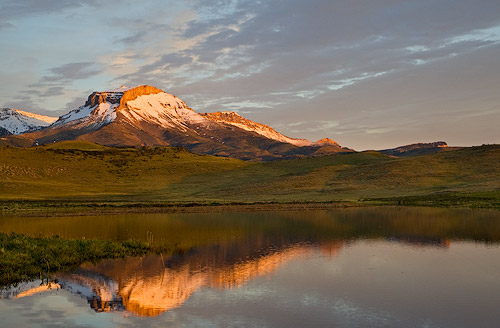
###
Subscribe to Whitefish Review or order a copy of issue #18 (Guest edited by author Rick Bass), “Growing Up & Getting Older,” containing the David Letterman interview, Montana Prize for Fiction winner, and 40 writers, artists, and photographers. You can also donate to our non-profit project to keep the arts flowing.

